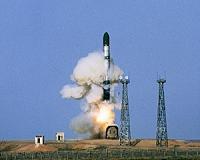 |
Moscow (AFP) Jan 25, 2011 Russian lawmakers are due this week to take the final steps in approving a nuclear arms reduction treaty with the United States that serves as the centrepiece of the two sides' rapprochement in ties. The State Duma lower house of parliament is expected to back the new START treaty by a wide margin for the third and final time Tuesday before passing it on to the Federation Council upper house for a Wednesday vote. The US Senate backed the first nuclear arms agreement since the Cold War era last month. But Russia's procedure-laden approach has seen the final vote pushed back until US President Barack Obama's annual State of the Union message -- a speech he could use to highlight his ability to engage Moscow. Russia's vote also comes less than a week after Obama sent a high-profile delegation to Moscow to negotiate the two sides' potential cooperation on missile defence. But this impressive flurry of negotiating activity comes only after the world's two nuclear superpowers essentially agreed to each interpret the new treaty in their own way. The United States sees the new START -- which reduces old warhead ceilings by 30 percent and limits each side to 700 deployed long-range missiles and heavy bombers -- as a concession to Russia that opens up room for more talks. It will allow Russia to take its aging weapons out of commission while keeping parity with the United States for the decade that the treaty remains in effect. Yet Washington has made clear that the pact will not limit its own ability to deploy a missile defence shield over Europe or develop fast-strike weapons that could reduce US dependence on nuclear arms. The Obama administration further wants to force Moscow into a new round of disarmament negotiations that focus on short-range nuclear missiles in which Russia has a distinct advantage. The prospects of those talks dimmed after Russia's top diplomat said Moscow was not yet ready to push cuts further than what Obama and Russian President Dmitry Medvedev had agreed in Prague on April 8, 2010. Russia's parliament meanwhile has packaged the treaty in a series of strident declarations that directly contradict the United States' military goals. "Our committee has prepared two draft statements that accompany this bill," the Duma's deputy speaker Oleg Morozov told reporters. Lawmakers are also to vote on -- and reject -- a Communist Party statement calling on Medvedev not to engage in any cuts. The Duma is due to adopt a non-binding statement that flatly rejects the United States' right to deploy a missile shield over Europe. Moscow fears the system could one day be turned into an offensive weapon that might devastate Russia and demands an equal say in any continental shield. Russia's statement will also say that any weapons developed under the Pentagon's Prompt Global Strike plan -- which primarily involve lasers and particle beams -- should also count against the limits set by START. And it will insist that any short-range nuclear missile negotiations also include talks on potential US plans to "militarize space" and press ahead with Washington's advantage in non-nuclear forces. Analysts suggest that this clash in interpretations enables both sides to proceed with limited long-range missile reductions while continuing talks over far more pressing concerns. "There are still plenty of issues out there. But the first thing the sides have to do is agree that they are ready to discuss other areas," said Moscow's Centre for Disarmament Director Anatoly Dyakov. "Ratification will end the first stage of negotiations and open the way for the next round of talks."
Share This Article With Planet Earth
Related Links Learn about nuclear weapons doctrine and defense at SpaceWar.com Learn about missile defense at SpaceWar.com All about missiles at SpaceWar.com Learn about the Superpowers of the 21st Century at SpaceWar.com
 Russia puts breaks on further nuclear cutbacks
Russia puts breaks on further nuclear cutbacksMoscow (AFP) Jan 19, 2011 The cheer over Russia's approval of a new nuclear disarmament treaty is short-lived as it masks Moscow's reluctance to ensure further cuts, threatening US President Barack Obama's vision of a nuclear-free world. Russia is going through the final motions of ratifying a new START treaty that reduces old nuclear warhead ceilings by 30 percent and limits each side to 700 deployed long-range miss ... read more |
|
| The content herein, unless otherwise known to be public domain, are Copyright 1995-2010 - SpaceDaily. AFP and UPI Wire Stories are copyright Agence France-Presse and United Press International. ESA Portal Reports are copyright European Space Agency. All NASA sourced material is public domain. Additional copyrights may apply in whole or part to other bona fide parties. Advertising does not imply endorsement,agreement or approval of any opinions, statements or information provided by SpaceDaily on any Web page published or hosted by SpaceDaily. Privacy Statement |